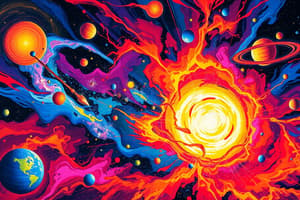Podcast
Questions and Answers
What is the most widely accepted theory on the origin of the universe?
What is the most widely accepted theory on the origin of the universe?
- The Pulsating Theory
- The Big Bang Theory (correct)
- The Multiverse Theory
- The Steady State Theory
What is the Big Bang Theory?
What is the Big Bang Theory?
- A theory that explains the existence of dark matter and dark energy
- A theory that explains the formation of galaxies
- A theory that explains the sudden inflation of the universe from a singularity to its current state (correct)
- A theory that explains the composition of the universe
Who was the first proponent to explain the Big Bang based on the 'primeval atom'?
Who was the first proponent to explain the Big Bang based on the 'primeval atom'?
- Edwin Hubble
- Albert Einstein
- Georges Lemaitre (correct)
- George Gamow
Who was the first proponent to explain the Big Bang based on the 'primeval atom'?
Who was the first proponent to explain the Big Bang based on the 'primeval atom'?
What is dark matter and how much of the universe does it make up?
What is dark matter and how much of the universe does it make up?
What is dark matter?
What is dark matter?
What is dark energy and how much of the universe does it hold?
What is dark energy and how much of the universe does it hold?
What is dark energy?
What is dark energy?
What is the cosmic microwave background radiation and what is its significance?
What is the cosmic microwave background radiation and what is its significance?
What is the cosmic microwave background radiation?
What is the cosmic microwave background radiation?
What is the composition of the universe mostly made up of?
What is the composition of the universe mostly made up of?
What is the composition of the universe?
What is the composition of the universe?
What is the evidence for the expanding universe and the Big Bang theory?
What is the evidence for the expanding universe and the Big Bang theory?
What is the significance of the redshift of distant galaxies?
What is the significance of the redshift of distant galaxies?
Flashcards are hidden until you start studying
Study Notes
Understanding the Big Bang Theory and the Composition of the Universe
- The Big Bang Theory is the most widely accepted theory on the origin of the universe, which explains that the universe underwent sudden inflation from a singularity to its current state.
- Edwin Hubble proposed the idea that galaxies are moving away from each other and this became evidence for the expanding universe.
- Georges Lemaitre was the first proponent to explain the Big Bang based on the "primeval atom," which is now known as the singularity.
- George Gamow formulated the modern Big Bang theory, which explains the distribution of chemical elements throughout the universe.
- Baryonic matter, which consists of protons, electrons, and neutrons, makes up only 5% of the universe's composition.
- Dark matter, which makes up 27% of the universe, exerts gravity but does not emit or absorb light, and its existence is necessary for the formation of large galaxies.
- Dark energy, which holds 68% of the universe, can explain the accelerating expansion of the universe but is not well understood.
- The composition of the universe is mostly unknown, with only 5% being ordinary matter and less than 1% being stars.
- The cosmic microwave background radiation is evidence for the Big Bang theory, as it provides a snapshot of the universe when it was only 380,000 years old.
- The abundance of light elements such as hydrogen and helium in the universe is also evidence for the Big Bang theory.
- The redshift of distant galaxies, which indicates that they are moving away from us, is further evidence for the expanding universe and supports the Big Bang theory.
- Scientists continue to study the Big Bang theory and the composition of the universe, seeking to better understand the mysteries of dark matter and dark energy.
Studying That Suits You
Use AI to generate personalized quizzes and flashcards to suit your learning preferences.




